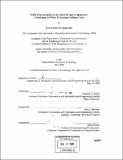| dc.contributor.advisor | Annalisa L. Weigel. | en_US |
| dc.contributor.author | Broniatowski, David André, 1982- | en_US |
| dc.contributor.other | Massachusetts Institute of Technology. Technology and Policy Program. | en_US |
| dc.date.accessioned | 2007-01-10T16:43:27Z | |
| dc.date.available | 2007-01-10T16:43:27Z | |
| dc.date.copyright | 2006 | en_US |
| dc.date.issued | 2006 | en_US |
| dc.identifier.uri | http://hdl.handle.net/1721.1/35586 | |
| dc.description | Thesis (S.M.)--Massachusetts Institute of Technology, Dept. of Aeronautics and Astronautics; and, (S.M.)--Massachusetts Institute of Technology, Engineering Systems Division, Technology and Policy Program, 2006. | en_US |
| dc.description | Vita. Page 154 blank. | en_US |
| dc.description | Includes bibliographical references (p. 146-153). | en_US |
| dc.description.abstract | It is often difficult to forecast the future budgetary environment for today's space systems. Indeed, multiple NASA missions and programs have been put into jeopardy or canceled outright, due to discrepancies between the expected and actual lifecycle costs. This has resulted in the loss of billions of dollars in taxpayer money spent on false starts. It is therefore in the best interests of all stakeholders, including NASA and the U.S. Congress, to arrive at a solution which will allow NASA's space exploration endeavors to be funded at a politically sustainable level. Understanding the mechanisms and processes by which a program may exhibit politically sustainability is of paramount importance to the space exploration enterprise. In particular, budgetary sustainability has proven to be a driver for The President's Vision for Space Exploration, which instructs NASA to "Implement a sustained and affordable" space exploration program. NASA, as a federal agency, is dependent upon the support of many stakeholders within the US political system, especially the President and members of Congress. Thus, a politically sustainable program must address the needs of these stakeholders. | en_US |
| dc.description.abstract | (cont.) Based upon strategies for agency-Congress interaction that are derived from the existing political science literature, this thesis proposes to translate policy directives into technical constraints or requirements for the Vision for Space Exploration. The effects of these changes in the technical system are then traced back to determine how they effect the political environment, articulating a feedback-loop that crosses between the political and technical realms. | en_US |
| dc.description.statementofresponsibility | by David André Broniatowski. | en_US |
| dc.format.extent | 154 p. | en_US |
| dc.format.extent | 10018489 bytes | |
| dc.format.extent | 10027135 bytes | |
| dc.format.mimetype | application/pdf | |
| dc.format.mimetype | application/pdf | |
| dc.language.iso | eng | en_US |
| dc.publisher | Massachusetts Institute of Technology | en_US |
| dc.rights | M.I.T. theses are protected by copyright. They may be viewed from this source for any purpose, but reproduction or distribution in any format is prohibited without written permission. See provided URL for inquiries about permission. | en_US |
| dc.rights.uri | http://dspace.mit.edu/handle/1721.1/7582 | |
| dc.subject | Aeronautics and Astronautics. | en_US |
| dc.subject | Technology and Policy Program. | en_US |
| dc.title | Political sustainability in the vision for space exploration : articulating the policy-technology feedback cycle | en_US |
| dc.type | Thesis | en_US |
| dc.description.degree | S.M. | en_US |
| dc.contributor.department | Massachusetts Institute of Technology. Department of Aeronautics and Astronautics | |
| dc.contributor.department | Massachusetts Institute of Technology. Engineering Systems Division | |
| dc.contributor.department | Technology and Policy Program | |
| dc.identifier.oclc | 74670108 | en_US |
